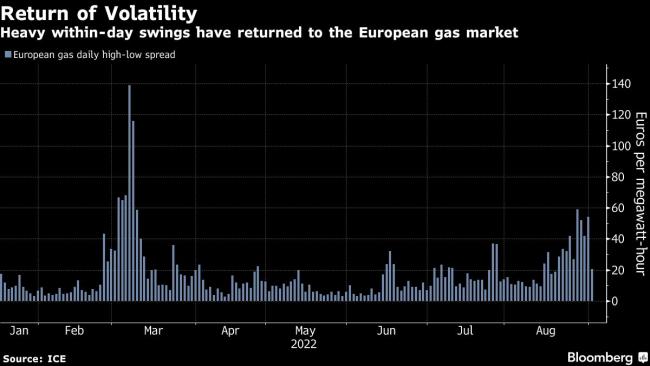Europe Gas Falls Further on Easing Demand and Higher Stockpiles
2022.09.01 12:50

(Bloomberg) — European natural gas declined for a fourth day as a recent record surge eroded demand, while a rapid filling of storage sites is helping ease some concerns over Russian supply.
Benchmark futures slumped as much as 7.2%, shedding about a third of the value from last week’s high. European Union inventories are filling about two months ahead of schedule, countering the risk that Moscow could keep shipments at minimal levels even after the end of a three-day maintenance shutdown of the key Nord Stream pipeline that started on Wednesday. An European official on Thursday warned of further supply cuts from Russia.
Even if gas flows stop after September, a storage buildup may reduce the “risk perception” if demand remains curtailed by 10% and strong imports of liquefied natural gas continue, according to Citigroup Inc. Consumption for the fuel in Europe slumped 12% in August compared with a year earlier, it said.
August was “another record-breaking month for EU gas storage building,” the bank said in a note. “Storage growth largely reflects the decline in gas demand and stable supply” as LNG and Norwegian shipments help offset the drop in Russian volumes.
Also see: More Winter LNG Cargoes to Europe as Japan’s Storage Jumps: BNEF
Still, gas prices are more than four times higher than they were a year earlier, while electricity also remains elevated. The EU is considering measures, including price caps, reducing power demand and windfall taxes on energy companies as it looks to protect the economy and cushion household bills, according to Mechthild Woersdoerfer, senior energy official at the European Commission. A plan for electricity will be outlined on Sept. 14.
Germany, Europe’s largest economy and one of the most severely hit by the crisis, needs to reduce gas demand by at least 20% and secure additional supplies, according to its energy regulator. The EU has already agreed a voluntary goal to cut consumption by 15%, but more measures could be taken to coordinate reduction.
The bloc is also looking elsewhere for supplies, while ramping up LNG purchases. Germany will charter an additional floating terminal for LNG imports beyond the four it is already installing.
Dutch front-month gas, a benchmark for Europe, fell 6.3% to 224.90 euros per megawatt-hour by 10:58 a.m. in Amsterdam. Prices are more than 30% lower this week, after settling at record levels on Friday. The UK equivalent contract fell 6.1%.
©2022 Bloomberg L.P.








